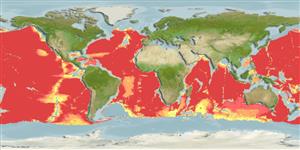>
Ophidiiformes (Cusk eels) >
Ophidiidae (Cusk-eels) > Neobythitinae
Etymology: Abyssobrotula: Greek, abyssos, deep, depth + Latin, brotula = little bud, shoot (Ref. 45335).
More on author: Nielsen.
Environment: milieu / climate zone / depth range / distribution range
Ökologie
seewasser bathypelagisch; tiefenbereich 3110 - 7965 m (Ref. 130003). Deep-water; 60°N - 60°S, 180°E - 180°E
In deep waters of tropical and subtropical areas of all oceans. 3 specimens from the Gulf of Guinea (Ref. 3686).
Size / Gewicht / Alter
Maturity: Lm ? range ? - ? cm
Max length : 16.5 cm SL Männchen/unbestimmt; (Ref. 3686)
Kurzbeschreibung
Morphologie | Morphometrie
Head short with downward inflection. Snout swollen. Eyes small. Poorly developed opercular spine. Anterior gill arch with 8-11 developed gill rakers. Precaudal vertebrae 18-21.
The previous maximum depth reported was 8730 m, supposedy the deepest fish caught. However there was a mistake in the logbook of the station, the correct depht is now 7965 m, the third deepes fish 9as of Novemeber 2023 (Ref. 130003). Uncommon species (Ref. 34024). Reproductive strategy possibly similar to other members of this family being oviparous, with oval pelagic eggs floating in a gelatinous mass (Ref. 205).
Life cycle and mating behavior
Geschlechtsreife | Fortpflanzung | Ablaichen | Eier | Fecundity | Larven
Nielsen, J.G., 1990. Ophidiidae. p. 564-573. In J.C. Quero, J.C. Hureau, C. Karrer, A. Post and L. Saldanha (eds.) Check-list of the fishes of the eastern tropical Atlantic (CLOFETA). JNICT, Lisbon; SEI, Paris; and UNESCO, Paris. Vol. 2. (Ref. 3686)
IUCN Rote Liste Status (Ref. 130435)
Bedrohung für Menschen
Harmless
Nutzung durch Menschen
Fischereien: nicht kommerziell
Mehr Information
NamenSynonymeMetabolismusRäuberÖkotoxikologieFortpflanzungGeschlechtsreifeAblaichenSpawning aggregationFecundityEierEientwicklung
Alter/GrößeWachstumLänge-GewichtLänge-LängeLängenhäufigkeitenMorphometrieMorphologieLarvenLarven Pop.Dyn.RekrutierungDichteBRUVS
ReferenzenAquakulturAquakultur ProfilZuchtlinienGenetikElectrophoresesVererbbarkeitKrankheitenVerarbeitungNutrientsMass conversion
PartnerBilderStamps, Coins Misc.LauteCiguateraGeschwindigkeitSchwimmstilKiemenoberflächeOtolithsGehirngrößeSehfähigkeit
Tools
Zusatzinformationen
Download XML
Internet Quellen
Estimates based on models
Preferred temperature (Ref.
123201): 0.7 - 2.4, mean 1.4 °C (based on 34031 cells).
Phylogenetic diversity index (Ref.
82804): PD
50 = 1.0000 [Uniqueness, from 0.5 = low to 2.0 = high].
Bayesian length-weight: a=0.00380 (0.00165 - 0.00876), b=3.14 (2.93 - 3.35), in cm total length, based on LWR estimates for this (Sub)family-body shape (Ref.
93245).
Trophic level (Ref.
69278): 3.5 ±0.6 se; based on size and trophs of closest relatives
Widerstandsfähigkeit (Ref.
120179): mittel, Verdopplung der Population dauert 1,4 - 4,4 Jahre. (Assuming tmax>3).
Fishing Vulnerability (Ref.
59153): Low vulnerability (10 of 100).
